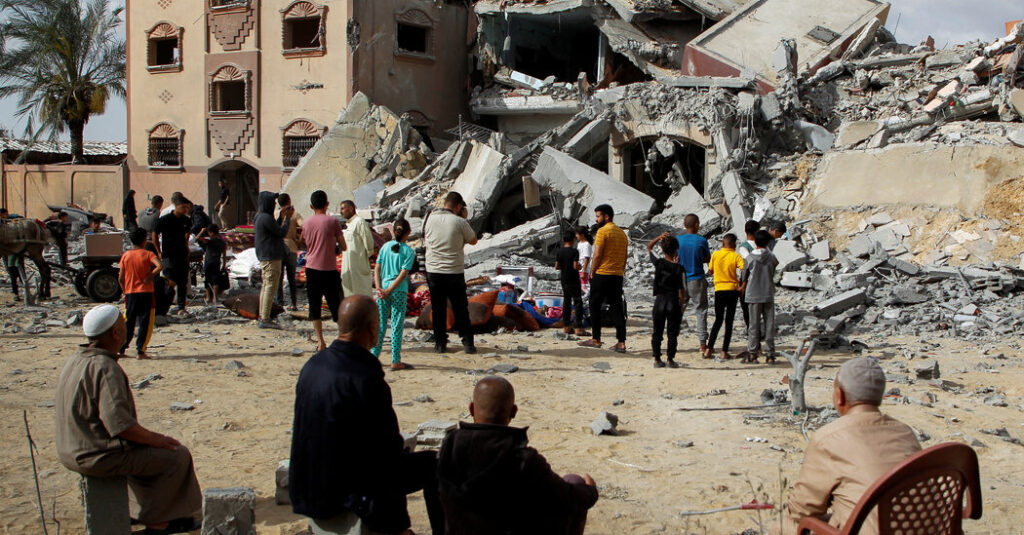Cairo ceasefire talks in trouble
Negotiations between Israel and Hamas have stalled again, meaning more uncertainty for the families of Israeli hostages and no quick relief for Palestinians in Gaza. Officials said the Hamas delegation withdrew from the talks as mediators worked to bridge remaining differences.
The main dispute is over the length of the ceasefire, with Hamas demanding a permanent ceasefire and Israeli Prime Minister Benjamin Netanyahu saying he is open to a temporary cessation of fighting.
Hamas blames the lack of progress on Netanyahu, who has vowed to launch a ground offensive in Rafah, where about a million Palestinians have been taking refuge regardless of a deal. Israel and the United States claim Hamas has been delaying a deal. Netanyahu said yesterday that ending the war would allow Hamas to rebuild its military capabilities and threaten communities across Israel.
Xi Jinping’s European Tour
Chinese leader Xi Jinping arrived in France yesterday on his first visit to Europe in five years. French President Macron will host a state dinner for him tonight. European Commission President Ursula von der Leyen will attend the talks in Paris.
Xi Jinping will also visit Serbia and Hungary. All three European countries support, to varying degrees, the new global order promoted by China—a world free from U.S. dominance and with which Europe has a looser, if not unfettered, relationship with the United States. Xi Jinping’s visit is likely to be seen as a thinly veiled move to divide Western allies.
What’s next: Xi Jinping’s arrival in Serbia tomorrow coincides with the 25th anniversary of NATO’s accidental bombing of the Chinese Embassy in Belgrade. The Chinese government continues to commemorate the strike and uses it as an opportunity to condemn Western hypocrisy and bullying.
Ukraine struggles to identify deceased
Two years into the war in Ukraine, families, lawyers and human rights groups say Ukrainian troops have suffered heavy casualties and cannot account for thousands of dead.
Some of the missing soldiers have been captured by Russian forces, but others may be dead and unidentified, lying in morgues while the government deals with a backlog of cases. Trench warfare often resulted in large numbers of bodies being abandoned in buffer zones, making it harder to get a clear picture of the war’s toll.
Looking at the numbers: In February, Ukraine’s President Volodymyr Zelensky put the number of dead soldiers at 31,000, and Kyiv said the number missing was about half that number. (U.S. estimates are much higher, indicating that 70,000 Ukrainian soldiers had died as of last August.)
More headlines
Cheaply made, haphazardly assembled drones are key to Myanmar’s rebels’ fight against the military junta. The resistance is getting creative, using instructions crowdsourced online, parts ordered from China and wires repurposed from drones used in agriculture — even as the power is out.
Drones have changed the course of the battle, helping rebels capture outposts by hovering and scaring soldiers into fleeing.
Lived: Bernard Hill, the British actor who embodied stoic male leadership in the “Titanic” and “Lord of the Rings” series, has died aged 79.
conversation starter
sports news
The Premier League: The race for the English football title this year has captured the attention of fans. But this is not just a British story. View photos here.
Formula 1’s greatest designers: The race to sign Adrian Newey in 2025.
art and ideas
From Bauhaus to Fun House
Frank Stella, an American artist whose relentless black paintings helped launch the Minimalist movement in the 1960s, died Saturday at the age of 87. But he was also its most famous renegade: in the late 1970s, he feverishly pursued the lavish deep space and baroque curves he had once eschewed.
Stella did not see art as a way to improve society or fight injustice. “If an artist wants to do something useful,” he said, “they can become a social worker or a politician. Or they can join the U.S. Army. Art does something different than what social workers do. Any abstract drawing Nothing like it helps anyone. Read our obituaries.
That concludes today’s press conference. Thank you for starting your day with The New York Times. — Natasha
PS Writer Scaachi Koul tells how TV show Indian Idol helped her mother beat cancer.
Contact Natasha and the team: Briefing@nytimes.com.

